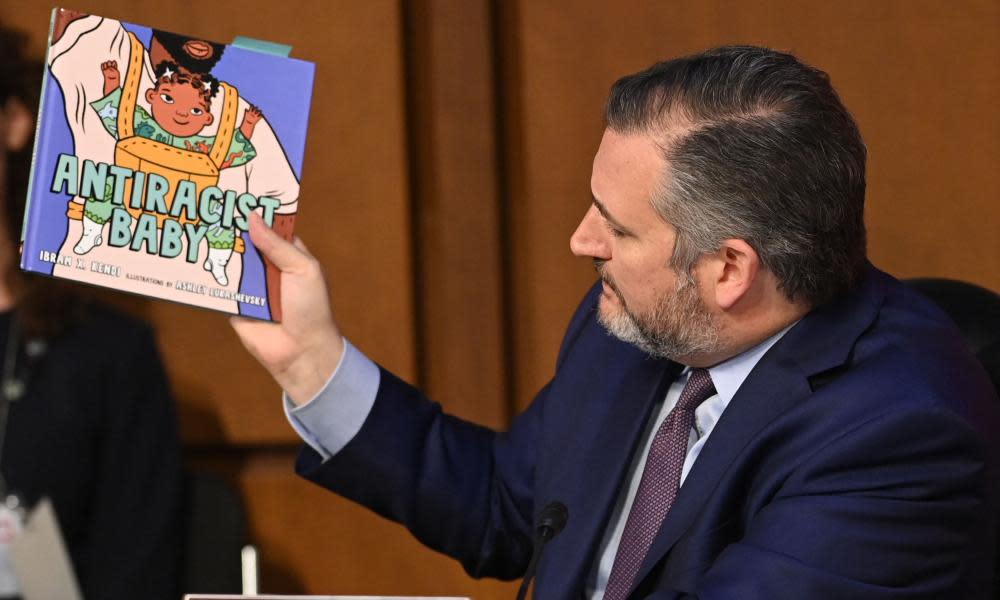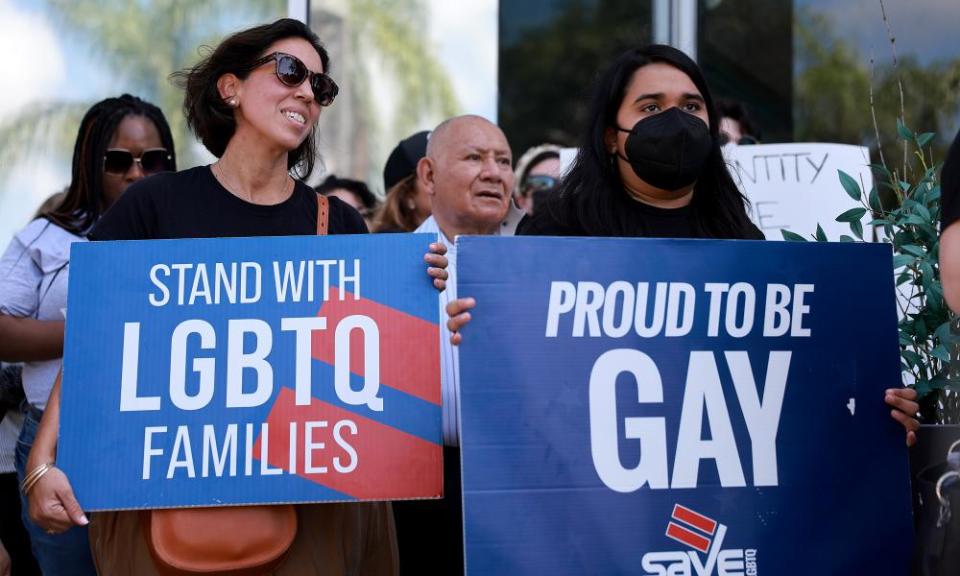Republicans’ midterms pitch: never mind the policy, here’s the culture war

- Oops!Something went wrong.Please try again later.
“Sue-thy-neighbour” laws that ban abortions after six weeks of pregnancy in Texas and now Idaho. A “don’t say gay” bill censoring discussion of sexual orientation in schools in Florida. A ban on Maus, a graphic novel about the Holocaust, by a school board in Tennessee.
America’s national government might be under Democratic control but its red states are on the march with sweeping laws targeting abortion, LGBTQ+ people and the teaching of race in schools that threaten to turn back the clock to an era when a citizen’s rights depended on where they lived.
Related: Republicans to field more than 100 far-right candidates this year
The offensive on cultural hot button issues also appears calculated to ensure that November’s midterm elections will be contested on a playing field of rightwing outrage. Democrats argue that Republicans resort to such territory in lieu of policy substance.
“There’s no serious agenda on the Republican side,” said Donna Brazile, a former acting chairperson of the Democratic National Committee. “It’s the same choir that had the same anthem from the 60s through the last election cycle. Without an agenda, without a leader, without a way forward, you have to rely on the old hits. It’s no longer on vinyl; it’s digital.”
Although President Donald Trump lost the White House and Republicans lost both chambers of Congress in 2020, Trumpism is thriving in the 30 states where Republicans have legislative control. Under Trump’s continued influence, they are exploiting wedge issues as never before.
Last year seven states imposed new restrictions on abortion, according to the Guttmacher Institute, the biggest such wave of legislation since the supreme court’s landmark Roe v Wade decision in 1973.
A law in Texas bans abortion after a doctor detects an embryonic heartbeat – usually around six weeks – and allows private citizens to sue clinics, doctors and anyone else accused of helping provide such abortions in the state. In the month after it took effect the number of abortions reported in Texas fell by 60%, with many women travelling to neighbouring states.
Deep red Idaho this week passed a similar measure, a six-week restriction again relying on private citizens to enforce the law. Larry Sabato, director of the Center for Politics at the University of Virginia, said: “We’re right back in the Soviet era with neighbours and family members snitching on neighbours and family members. That’s unbelievable.”
Missouri, Oklahoma and Tennessee are considering similar proposals, while earlier this month Florida’s Republican-led legislature sent a 15-week abortion ban to Governor Ron DeSantis for signature.
Republican state legislatures have also launched what the Human Rights Campaign, America’s biggest LGBTQ advocacy group, describes as the worst attack on LGBTQ+ rights in decades. A record of more than 300 anti-LGBTQ+ bills have been introduced this year, it says, with 130-plus specifically targeting transgender people.
The HRC describes the legislation as part of a coordinated effort by powerful interests promoted by rightwing entities such as the Heritage Foundation. “These groups peddle in fear and pit people against each other to marginalize and punish LGBTQ+ people – and especially transgender children.”

Among the most egregious examples is Florida legislation dubbed “don’t say gay” that would bar instruction on “sexual orientation or gender identity” in schools from kindergarten through grade 3. Its dog-whistling impulse was evident when Christina Pushaw, press secretary for DeSantis, tweeted: “The bill that liberals inaccurately call ‘don’t say gay’ would be more accurately described as an anti-grooming bill.”
Cathryn Oakley, state legislative director and senior counsel for the Human Rights Campaign, said: “We’re looking at one of the worst legislative sessions for LGBTQ issues ever in terms of volume of bills introduced.”
“Almost all of them are targeting transgender youth, whether that’s through bans on trans students being able to play school sports consistent with their gender identity, bans on trans youth being able to access gender-affirming medical care, bans on trans students being able to use the correct restroom in school.”
Oakley added: “The ‘don’t say gay or trans’ bill lives at the intersection of this huge effort to attack LGBTQ but particularly trans youth and the movement that we’ve seen resurrected in the recent years that’s about surveilling teachers and censoring curriculum, whether that’s talking about critical race theory, about what’s in the sex ed class or about banning books.”
In Tennessee, the McMinn county school board removed Maus, a Pulitzer prize-winning graphic novel about the Holocaust, from its curriculum because of “inappropriate language” and an illustration of a nude woman (actually a cartoon mouse). The state’s governor, Bill Lee, then proposed a law for closer scrutiny of school libraries so students consume “age appropriate” content.
Tennessee also banned the teaching of a critical race theory (CRT), an academic discipline that examines how racism becomes embedded in legal systems but has been caricatured by Republicans as a divisive anti-white ideology.
Eight other Republican-led states – Idaho, Oklahoma, Texas, Iowa, New Hampshire, South Carolina, Arizona and North Dakota – had also passed legislation against the teaching of CRT as of last November, according to the Brookings Institution thinktank in Washington, with nearly 20 states introducing or planning to introduce similar legislation.
Brookings also noted that the conservative Fox News channel had mentioned “critical race theory” 1,300 times in less than four months. CRT was a frequently cited bogeyman at the recent Conservative Political Action Conference in Orlando, Florida, which was themed “Awake not woke” – a sure sign of its potential to energise and rile up the base for electoral purposes.

Elaine Kamarck, a senior fellow at Brookings and former Bill Clinton administration official, said: “There were some very good things about the old Republican party. Now it’s a party of racists and homophobes and people pursuing bizarre cultural things. It’s just crazy.
“They’re a bankrupt party and yet they manage to do well on these kinds of issues because people get emotional about them and don’t really understand or in fact care about the economic issues. Democrats have been tone deaf thinking that the economic issues will always trump the cultural issues. They don’t.”
For Republicans, this week’s Senate judiciary committee hearing for Judge Ketanji Brown Jackson seemed to be as much as about campaigning for the 2022 midterms, which will decide control of the House of Representatives and Senate, as the first Black woman nominated to the supreme court.
Dwelling on CRT, Senator Ted Cruz of Texas held up the book Antiracist Baby by Ibram X Kendi and demanded: “Do you agree… that babies are racist?” Senator Marsha Blackburn of Tennessee asked: “Can you provide a definition for the word ‘woman’?” Jackson replied: “I can’t … I’m not a biologist.”
Tara Setmayer, a senior adviser to the anti-Trump group Lincoln Project, said: “The Scotus [supreme court] nomination hearings this week were a window into the Republican party’s strategy going into midterms and 2024. They have no policy agenda. They are strictly focused on culture war wedge issues because they’ve had success energising their base with them and the people who are leading the charge are fundamentally unserious people.
“Senator Mitch McConnell has already said that he’s not releasing a policy agenda. There’s a reason for that. Culture war politics can work and Democrats run the risk of underestimating how powerful and energising this tactic of politicking can be. They underestimate it at their own peril.”
What links many hot button issues is children. Whether unborn or at school, they are portrayed by Republicans as vulnerable to sinister forces aligned with Democrats and leftwing militants. Glenn Youngkin, the governor of Virginia, set up a tip line so parents could send “reports and observations” about perceived objectionable conduct by teachers and school staff.

The appeal to parental instincts rather than to policy judgments was accelerated by frustrations over mask mandates and school closures during the coronavirus pandemic.
Setmayer, a political commentator and former Republican communications director on Capitol Hill, said: “Some of the issues speak to the fundamental desire to protect your children. There’s a reason why Republicans for decades have always included getting involved at the school board level as part of their grassroots playbook.
“Any time you frame a political issue around children, you can activate voters who may not have been activated before because they want to make sure that their children are safe. It becomes a more righteous issue; it’s not just about them in their minds.”
Not all Republicans are on board. This week Indiana’s governor, Eric Holcomb, and Governor Spencer Cox of Utah vetoed legislation that would bar transgender girls from taking part in girls’ sports at school. But such voices remain in the minority, with the Trump-dominated party only likely to become more aggressive on hot button issues as the polls draw closer.
Monika McDermott, a political science professor at Fordham University in New York, said: “At this point Democrats are in some ways dismissing it as well as though they think people will see through it and I think that’s a big mistake.
“They need to fight this head on, counter these arguments, make things clear, try to redefine things like so-called critical race theory and explain the reasons why they support teaching this kind of historical perspective in schools and why it’s necessary, and why abortion has been legal for so long and what’s happening to it now.”
She added: “They need to do the same kind of call to arms that Republicans are doing but on the liberal side, and I don’t see them doing that at this point. I see them resting on their laurels to a certain extent, targeting specific districts. It’s all about strategy but they’re not getting at the heart of the matter.”

